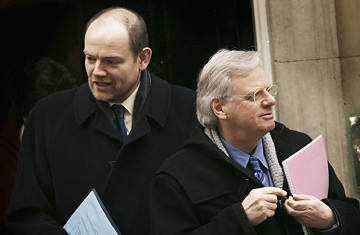
The BBC's Director-General Mark Thompson (L) and ITV Chairman Michael Grade
At 2 a.m. on Thursday in the English seaside town of Whitehaven, a transmitter tower that had broadcast British Broadcasting Corporation (BBC) programs to analog television sets since the 1950s switched off. The abrupt blackening was the first part of a nationwide program to make British television entirely digital by 2013.
A few hours later, staff at the BBC felt another effect of this sea change in broadcasting, as the broadcaster announced plans to cut 1,800 jobs, sell its iconic London headquarters and reduce the number of original programs it makes by 10% in an effort to fund the move to digital and create an integrated, multi-media news service.
On what The Guardian newspaper is calling a "day of reckoning" for British broadcasting, a rival network to the BBC, ITV, revealed Thursday the results of an independent inquiry that found it had made $15.8 million from bogus interactive competitions in which contestants were charged despite having no chance of winning. (The network pledged to compensate more than 8 million viewers. The BBC has also come under criticism for 11 cases of rigged or prerecorded contests earlier this year).
In an email to staff, BBC Director-General Mark Thompson said the job cuts — part of a six-year reform plan to cover a $4.8 billion funding shortfall — would be achieved primarily by integrating existing programming. Currently, separate journalists and producers from various radio and television stations often cover the same topic. BBC employees will soon be required to work across all media to help reduce this duplication. The BBC will close 2,500 job posts in the next six years while creating 700 posts, resulting in a net loss of 1,800 staff.
Defending the cuts, Thompson said they were necessary to prevent the BBC from "drifting steadily into irrelevance". Thompson said the BBC also plans to sell its Television Center in west London, which has been the production hub of the 85-year-old pillar of British society since the 1960s. It will also begin accepting advertising on its hugely popular website, bbc.com
The BBC receives public subsidy from viewers and Thompson said it could not fund the change to digital, anticipated to cost $5.7 billion, on public funding alone. Earlier this year the British government forced the BBC to accept less money in viewer fees than the BBC asked for.
The BBC now faces the prospect of strike action amid claims by the broadcasting union BECTU and the National Union of Journalists that the overhaul will threaten the quality of public broadcasting in Britain. A move to outsource 6,000 jobs in 2005 was met with a one-day stoppage that blacked out several BBC stations.
In a move that further revealed the complications surrounding the digital upheaval, rival broadcaster ITV suffered on Thursday a huge embarrassment after a review by international auditing firm Deloitte found that almost 10 million phone and text message votes from viewers on interactive ITV programs such as The X Factor were never counted. ITV and other broadcasters say increased viewer interaction will be one of the primary benefits of digital television. ITV said it would cost $36 million to fix problems with interactive services on more than 60 of its television programs.
The ITV executive chairman, Michael Grade, a former chairman of the BBC, said: "I've never been involved in anything as grisly as this or anything that's damaged broadcasting as much as this."
